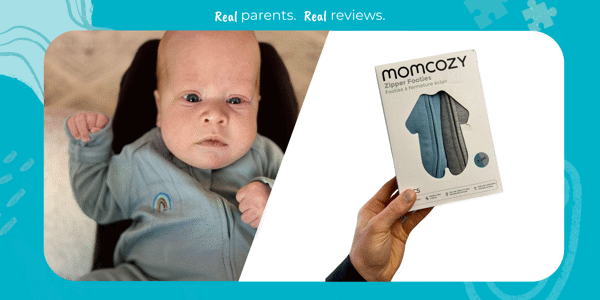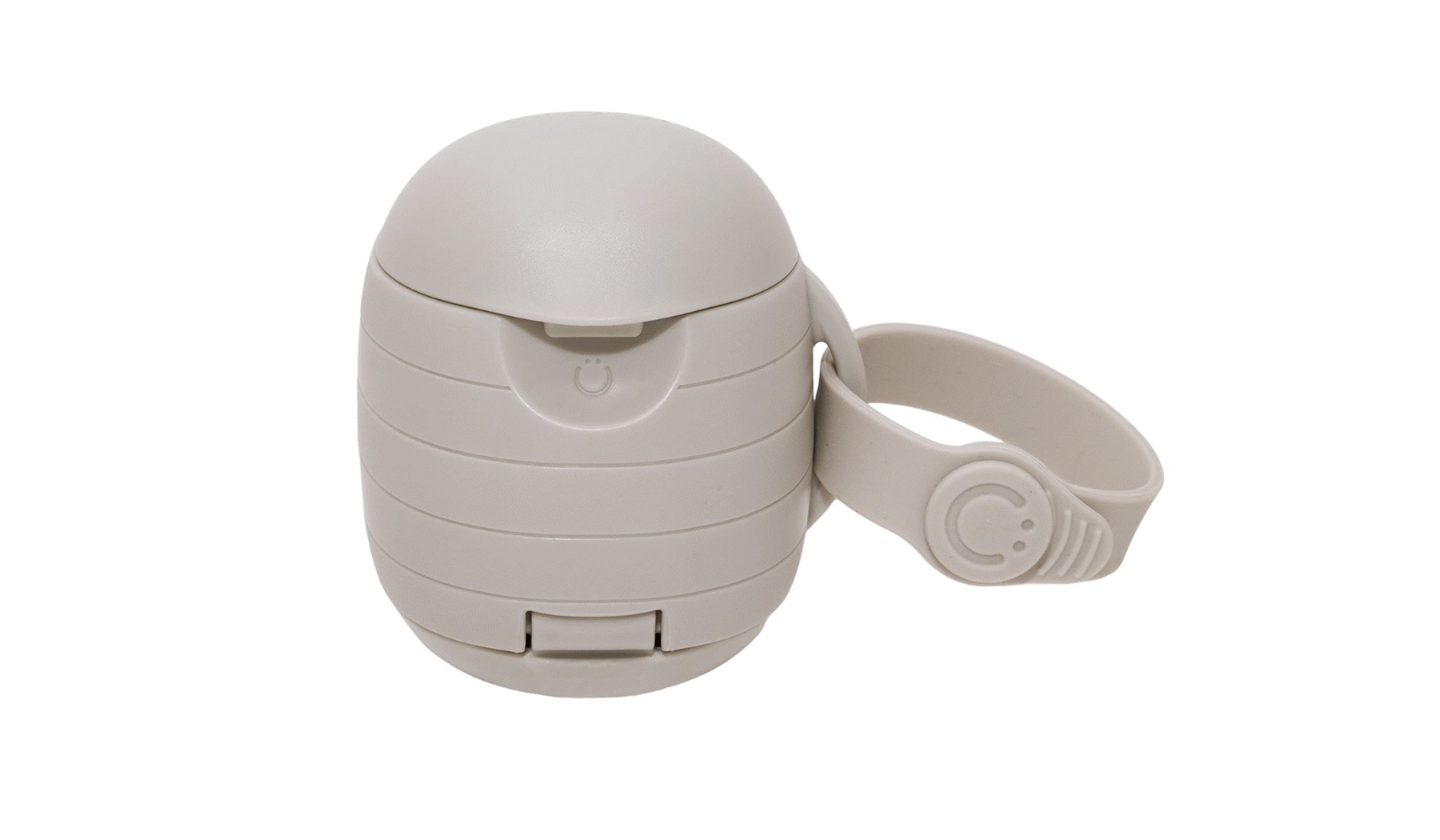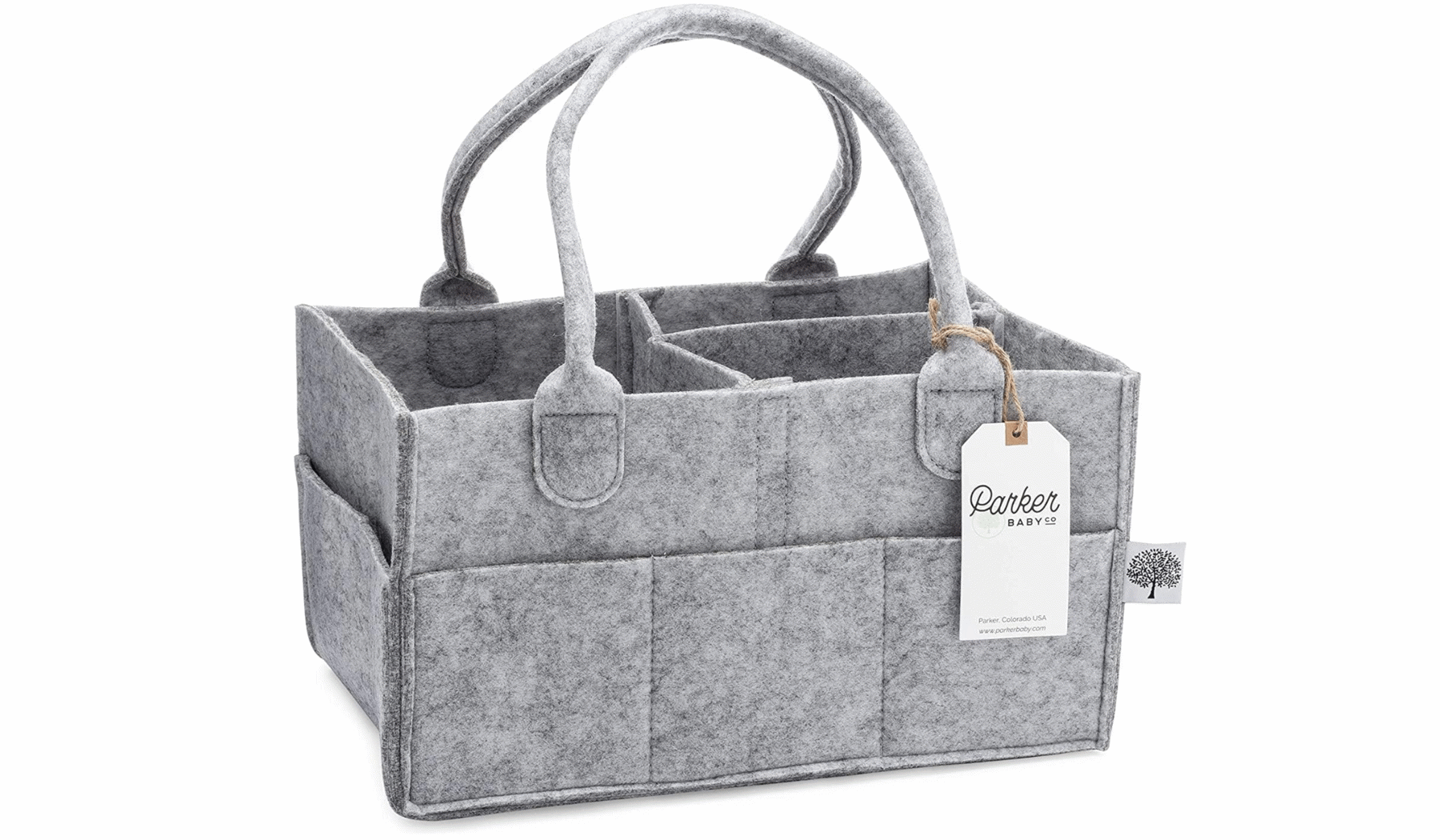In the first month, most babies will regain any weight lost after birth and may even start to surpass their birth weight. His little body will begin to fill out, and his muscles will become slightly more developed as they wriggle around.
During the first few weeks, your baby's appearance will likely change. For example, your baby's skin color may be a shade or two lighter than their eventual skin color, they may have swelling around their face or eyes, and if they journeyed through the birth canal, they might have a cone-shaped or uneven head. Also, after being inside your uterus for so long, your little one will look as though they're curled into a fetal position most of the time, their arms and legs not fully extended. After some time, these things will change. Their head shape will become rounder, their skin will darken, the swelling will go away, and their bodies will stretch out.
Babies are born ready for social instruction, and they look to you for this! Your love and care have a direct impact on their development. One primary foundation for healthy development is trust between baby and mother. When your little one cries or is in distress, it is important that you always respond as soon as possible. Pick him up! This will help solidify that bond and establish a healthy development pattern. This month, your baby may smile as he is sleeping. This is called a smile reflex. He won't flash a genuine, social smile until he is about six to eight weeks old.
How often should you feed your newborn? Should you wake him for feedings? How much milk or formula does he need? Is he getting enough? As a new parent, these questions are likely swirling through your mind. Don't worry! We have the answers.
Newborns, even formula-fed ones, should feed on demand (whenever they cry out of hunger). Your baby was born with a rooting reflex, and he can smell breastmilk, so he will know how to find your breast to eat. He’s been practicing that sucking motion for a while now. In fact, if you touch your baby's mouth with your nipple or finger, your baby will open their mouth!
Newborns have small stomachs and need frequent feedings. Most babies need to eat every two to three hours or about 8 to 12 times every 24 hours. (If your baby doesn't wake up during the night to feed, you'll need to wake them every two to three hours to offer your breast, especially if your newborn is very small, losing weight, or jaundiced.)
The last nine months were filled with anticipation. Wondering what your newborn will look like, how big they will be, and if they will sleep well. Curious if you'll heal quickly. And if you'll get the hang of breastfeeding or use formula. And now that your little one is here, you're finally getting those answers!
During this first month postpartum, remember to take care of yourself. This journey is everything – exciting, intimidating, surprising, and scary – for new and seasoned parents alike, and we understand! You're recovering from birth while simultaneously experiencing these incredible first moments with your newborn. Sometimes you'll feel amazing, immense joy; other times, you'll wish for sleep, want to poop (that first postpartum poop is NO joke), and cry for reasons you cannot fully fathom. As you move through physical and emotional changes, check out our articles and tools for new tips and advice. We are here to help!
A lot is going on, physically speaking, after having a baby. Be sure to make every postpartum appointment scheduled with your healthcare provider, even if you feel fine. After giving birth, you are at risk for many health complications and risks, and your doctor will check for these and treat them accordingly.
For the first few weeks postpartum, let someone else take care of all responsibilities other than taking care of yourself and feeding your baby if you can. Your partner, spouse, loved ones, and close friends are great examples of people who can help. Learn how to ask for and accept help this month. A family member, such as your little one's grandmother or aunt, may even be able to spend a few days with you, allowing you the time you need to rest and recover.
You may feel a lot of extra stress and overall emotions this month. Most of this is normal; however, if you're worried about your mental health, get help immediately. Your baby didn't come with an instruction manual, and you're likely feeling overwhelmed.
Baby blues, or postpartum blues, are any feelings of sadness you experience within the first few days and up to two weeks after having a baby. These feelings usually go away on their own. In the meantime, don't drink alcohol, get as much sleep as you can, try to connect with other new moms (joining a local mom group is a great way to do this!), ask your spouse, partner, family, or close friends for help, and take some time for yourself.
If these feelings don't go away, or if the feelings of sadness, anxiety, and fatigue get stronger and last longer than two weeks postpartum, you may be dealing with postpartum depression (PPD). PPD isn't uncommon for women who've recently had a baby, but these feelings can make it hard for you to care for yourself and your baby, and you will need help. Tell your spouse and your medical care provider right away. If you are worried about hurting yourself or your baby, call emergency services (911) immediately.
Right now, sleeping is at the top of your baby's to-do list! Newborns should sleep about 15-17 hours over a 24-hour period; however, anywhere from 14-18 hours of sleep is normal.
Your little one might take a bunch of little naps all day long, or he may sleep for a few hours at a time. Every baby is different. Some babies will start sleeping through the night (about 5-6 hours) before others. The important thing to track is the combined total hours throughout the entire day. Sleeping schedules will also vary from baby to baby, and it will be a few months before anything is officially established.
If you've had a hospital birth, your baby's first checkup, performed by a pediatrician, occurs before you leave. A few days after birth (usually when your newborn is 3-5 days old), your newborn will have his first well-visit.
At this well-visit, your pediatrician will want to know how often your little one is feeding, sleeping, peeing, and pooping. They will take your baby's measurements (head circumference, weight, length) and vitals, look at their ears, nose, and throat, listen to their heart, check their reflexes, assess their legs and hips, look for jaundice and other health problems, and answer any questions or concerns you might have.
They will also check your little one's umbilical stump and diaper area (and if your baby was circumcised, the doctor will check that it is healing correctly). If you have questions about caring for your baby's umbilical stump or circumcision, now is the time to ask. During this time, your doctor will often talk to you about ensuring your baby has a safe sleeping environment, offer tips to help you safely provide tummy time, and advise on giving your baby vitamin D drops.
Over the next few weeks, your baby's umbilical cord stump will eventually dry out, turn black, and fall off (usually within about two weeks). In the meantime, be gentle with it. Folding down the front of your little one's diaper about an inch can help to minimize discomfort. Be sure to keep the stump dry, stick to sponge baths, and let it fall off on its own. Contact your pediatrician if your baby's stump hasn't fallen off after three weeks or if you notice any redness, swelling, pus oozing, or a pink, moist bump, as these are signs of infection.
Did you know newborns don't have tears when they cry? Until babies are 1-3 months old, their eyes don't produce enough liquid to form teardrops when they cry. By week two, their lacrimal glands will increase in tear production, but not enough to drop from the eye.
Your little one should weigh anywhere from about 6 pounds to 10 pounds, and boys tend to weigh more than girls. Most newborns will lose a little weight after birth - about 10 percent of their birth weight - and should regain it by the time they are about ten days old. If they haven't regained this weight and you’re breastfeeding, your pediatrician may advise you to supplement your breastmilk with baby formula for a few days. This can occur with babies born via C-section because it may take longer for your milk to come in after you've had a C-section or if you couldn't nurse your baby immediately after giving birth. Don't worry if this happens. It doesn't mean you won't be able to breastfeed. It just means your little one needs a little extra help gaining weight!
You may feel like your newborn only eats, sleeps, and cries, but so much more is happening! Their brains are learning and processing information at a rapid pace. Before birth, they start recognizing sounds, which only intensifies after birth. Newborns know their mother's voice, and because of this, they will focus their attention on their mother's voice more than anyone else. If you regularly played certain songs while pregnant, your little one will likely recognize those songs, too.
Right now, sleeping is at the top of your baby’s to-do list! Newborns should sleep about 15-17 hours over a 24-hour period; however, anywhere from 14-18 hours of sleep is normal.
Your little one might take a bunch of little naps all day long, or they may sleep for a few hours at a time. Every baby is different.
Newborns can't tell the difference between night and day, and there's little you can do to change this. Your baby will sleep when she needs to sleep! Some things you can do to encourage nighttime sleeping include swaddling, keeping the lights dim, and rocking your little one while gently singing to her.
Rest is one of the most essential things for a new Mama like yourself! Get rest whenever you can. For a few days after giving birth, you may feel cramping in your stomach as your uterus begins to shrink to its original size. You may also be experiencing a significant amount of perineal pain (the area between your rectum and vagina), especially if you are experiencing any tearing or had an episiotomy due to a vaginal birth.
To help with the pain, you can ice the area as needed. When wiping the site, go front to back. Feel free to use products that contain witch hazel, a natural cooling and healing agent that reduces swelling, eases hemorrhoids, and relieves pain. Taking warm baths and sitting on a donut-shaped cushion may also help relieve some pain.
In addition to resting whenever you can, you need to eat a healthy, balanced diet. Many lactation consultants say you must eat whenever you feel hungry. Still, many mothers often feel too tired or busy to do this.
You need to take care of yourself. A balanced diet of vegetables, fruits, grain, dairy, and protein will help you have enough energy to care for your little one and yourself. In addition to a healthy diet, you must ensure you're drinking enough fluids, like water and milk.
Sometimes, people will offer, and sometimes you'll have to ask for help, and either way, it's okay! As much as we want to be able to do it all, we can't. So if someone offers to make and bring you a meal, accept it. Don't be embarrassed by your mess if someone wants to clean your house. Accept the offer! If you need help running errands, ask someone. It may initially feel odd and uncomfortable – to ask for help – but this will give you more time with your little one. And if you need a break, there's no shame in asking a friend or loved one to watch your baby so you can rest.
What about visitors? Everyone will want to visit you and meet your newborn, parents, and friends. Remember that you and your newborn need time to get to know each other too. It's okay to say no or limit the time a visitor stays, especially during the first six weeks when your newborn's immune system is still fragile and developing.
If you decide to have visitors, choose a time that works for you, and don't worry about cleaning up your home before they arrive. Make sure everyone washes their hands before touching or holding your baby. If they are sick or have someone in their home who's sick, ask them to wait until everyone is healthy. If you get tired, be honest and let them know you need to rest. Your health and happiness and your little one's health and happiness must come first.
If your swaddled little one starts to roll over, it's time to stop swaddling.
You will often feel sleep-deprived, but no matter how tired you are, do not fall asleep while holding your little one due to the risk of SIDS or suffocation. For a safe sleep environment:
In the first month, feeding patterns are crucial for your little one’s growth and development. Breastfed babies will start to establish a more consistent nursing routine, while formula-fed babies will get used to following their feeding schedule.
Newborns have limited vision at birth, but over the first month, your little one will start to become more aware of her surroundings. They can now see objects and people at a short distance and may start to follow moving objects with their eyes towards the end of this month.
When your little one hears a loud noise or senses sudden movement, the Moro (startle) reflex can cause your baby to react. This can even happen while they are sleeping! Another reflex your baby is born with is the grasping reflex, which is involuntary for now. Still, how they grab ahold of your finger is pretty adorable, so enjoy it!
Some signs that your little one is hungry include rooting, sucking on things, opening their mouth, fussing, or licking their lips. If your baby is crying, you’ve likely waited too long! It can take a while to establish a feeding pattern, and as your child continues to grow, this pattern will change. In the first week, your baby should eat 1-2 ounces per feeding. This will gradually increase to 2-3 ounces around week two and 3-4 ounces by the end of week four. Measuring the milk can be easy if you feed your little one infant formula. But it's hard to know if your baby is getting enough if you're breastfeeding.
Don't stress; you can easily figure this out! If you hear your little one swallowing while breastfeeding, and if your full breast becomes soft and your little one appears satisfied and happy afterward, you can relax because your baby is most likely getting enough milk.
If you had a C-section, you've had major surgery. You're on pain medication, you've lost blood, and your belly is exceptionally sore due to the incision. The pain should subside about three days post-surgery, but the incision will remain tender for a few weeks. You need to take it easy and not lift anything heavier than your baby for a while.
You may feel a tightness in your chest at times, and this is actually normal. And you'll want to hold your stomach when you laugh, sneeze, or cough to support your belly because it will hurt. Also, taking showers will be tricky due to the incision covering.
Ask your doctor if your incision was closed with glue, staples, or stitches and whether or not you can remove the bandage for showers. Do not bathe, soak in a hot tub, or swim until your doctor says you can. If your incision is leaking discharge, bleeding, red, burning, or swollen to the touch, if your pain increases or you develop a fever, let your doctor know immediately, as these are signs of infection.
Whether you delivered vaginally or via C-section, you'll be bleeding vaginally for about six weeks. At first, you'll bleed a lot. And we mean A LOT. This is normal. Your body is ridding itself of all the extra fluids and tissue from pregnancy and childbirth. At first, it may be bright red and contain some blood clots; over time, the flow will decrease, and the color will lighten.
While it might not be the most ideal or fun activity, your baby's first checkup is very important. Following the recommended schedule of well-visits will help you know your child is growing correctly and reaching milestones. It can also help you identify any potential problems as soon as possible. Your doctor should also talk to you at each visit about the vaccinations and immunizations available for your child.
Your newborn should receive their first shot of Hepatitis B (HepB) vaccine at the hospital within 24 hours of birth and the second dose of HepB vaccine within 1-2 months.
Suppose you had a home birth or gave birth at a birthing center with a midwife. In that case, the midwife can provide your child's pediatric care for the first six weeks, meaning they will perform your baby's first wellness check and their two- and four-week checkups.
Your midwife will not give immunizations, but they can offer vitamin K, eye ointment, heel pokes, a hearing screening, and a CCHD screening. They can also take care of normal amounts of jaundice and will refer you if your little one needs bilirubin lights.
Newborn babies are born with various reflexes that help them survive and adapt. In the first month, some of these reflexes, such as the Moro reflex (startle reflex) and rooting reflex, are still very active in your little one. These reflexes will gradually diminish as their nervous system develops.
Are moods contagious? Yes! Your little one can tell the difference between a happy face and an angry face, and they will always prefer a happy face. Babies can tell if their parents are fighting, and too much exposure to this can affect their brain development. Though they may not react, babies can also tell when their mother is in distress, and they can feel her stress.
Babies can also tell the difference between their mother's native language versus a foreign language. Research has even shown that three-day-old babies can pick out individual words from a stream of speech! To help your baby learn, speak to them in a slow, melodic tone and repeat phrases, saying things like, "I love you." Repeating words will also help your little one learn about emotions. The more expressive you are, the better!
Your baby is born nearsighted, which means their vision is pretty blurry. In fact, they can only see about eight inches away for the first few weeks! But this doesn't mean they aren't interested in viewing the world around them. Babies will pay attention to faces, so cuddle them often and hold your face close to theirs when talking to them! Let your little one study your expressions and your features, your eyes, nose, and mouth. Let them feel, see, hear, and smell you. Look them in the eye; they may not mimic you, but they are paying close attention and learning.
Some new parents worry about how to tell if their newborn is getting enough nutrition and consuming enough each day. One way to tell if your baby is getting enough milk is by keeping track of their diaper output. You should be changing about five to six wet diapers per day, and for formula-fed babies, you should have one poop-filled diaper per day. Breastfed babies will poop more often (possibly after every feeding).
Your pediatrician will likely ask you for the exact number, so remember to track each wet and dirty diaper daily! For the first six months, babies only need breast milk or formula. No matter what, wait to feed your little one solid foods until they are at least 4-6 months old, and wait to give her water, even small amounts, until they are at least six months old.
If you're breastfeeding, you may want to wait a month or two before giving your baby a pacifier to avoid nipple confusion and nipple preference.
Are you constipated? Do you have painful or unavoidable gas? Many moms go through this ... and your first poop will feel like a bowling ball being shoved through a pinhole. The best thing you can do is eat foods high in fiber, drink a lot of water, and wait for this experience to pass. It won't be fun. But know that we have all been there. We don't often talk about it, but we should because it's an experience most of us are not expecting. Just remember you are not alone.
If you're experiencing any swelling in your hands or feet, this is normal. It doesn't look very good, but it's just another one of the many side effects of bringing a child into this world. It will take some time for this swelling to go away. In the meantime, keep your feet elevated, wear compression socks, try to stay cool, and get your partner or spouse to massage your feet as often as possible!
It is common for your breasts to feel tender as they become engorged and filled with milk. If you had a C-section or could not breastfeed your little one within 30 minutes after giving birth, this engorgement may take a while to arrive. If your swelling breasts are painful, take a warm shower or lay a warm towel over your breasts (this will also help with milk flow). Nursing pads will help with any leaking that may occur in between feedings.
Try not to miss any feedings, especially at night, to avoid becoming extremely engorged. Regardless, if you are nursing, your nipples are hurting. Some creams can help with this, especially if your nipples are cracking.
If breastfeeding becomes extremely painful, don't be afraid to ask a lactation consultant for help. There may be a problem with how your little one is latching onto your nipple. If you're struggling with breastfeeding in any way, stay positive. Breastfeeding is difficult. It hurts. And if you decide to go with infant formula, you are not alone, and you are not a "bad mother," and wear a supportive bra. Everyone is different, and that's okay!
Many changes are happening in your life and your relationship with your spouse or partner. If you're trying to do everything yourself, let your partner help care for your baby. Ask them to bring your little one to you for nighttime feedings. Let them hold your baby while you nap. Read baby-care books together. Talk to your partner or spouse about your feelings to avoid feeling frustrated or hurt. Discuss with them how you both will want to handle the changes you're experiencing together.
You may feel a lot of extra stress and overall emotions this month. Most of this is normal; however, if you're worried about your mental health, get help immediately. Your baby didn't come with an instruction manual, and you're likely feeling overwhelmed.
Baby blues, or postpartum blues, are any feelings of sadness you experience within the first few days and up to two weeks after having a baby. These feelings usually go away on their own. In the meantime, don't drink alcohol, get as much sleep as you can, try to connect with other new moms (joining a local mom group is a great way to do this!), ask your spouse, partner, family, or close friends for help, and take some time for yourself.
If these feelings don't go away, or if the feelings of sadness, anxiety, and fatigue get stronger and last longer than two weeks postpartum, you may be dealing with postpartum depression (PPD). PPD isn't uncommon for women who've recently had a baby, but these feelings can make it hard for you to care for yourself and your baby, and you will need help. Tell your spouse and your medical care provider right away. If you are worried about hurting yourself or your baby, call emergency services (911) immediately.
No two babies are alike. They are all unique and develop and reach milestones at different rates. Certain activities can help your baby develop and learn. A great activity for your little one to start as soon as you can is tummy time!
Tummy time helps your little one strengthen her neck muscles and eventually push up, roll over, sit up, and crawl. This will help your baby avoid getting a flat spot on the back of their head from lying on their back for too long.
After four weeks, your little one may be able to lift her head for a few seconds during tummy time and maybe even move a little side to side, but most babies won't lift their heads or show good neck control until month two.
If you have older children, they are experiencing a significant life change as well. Talk to them. They may have little interest in their new sibling, revert to younger behaviors, or handle the role of being an older sibling with great excitement. However they react, be supportive and loving. Do not punish them for negative behaviors; this can mess with their sense of self and belonging.
To help them feel more secure, keep bedtime routine and activities as close to normal as possible and set time aside every day to be alone with them. Ask them how they feel; if they're too young to express their feelings, help them find the right words.
Teach them how to hold their new sibling properly. Tell them why being an older brother or sister is so important! Explain to them why their new little brother or sister is so fragile, why we change their diapers, why they cry, and why they need constant supervision.


The information on the Your Baby Club website is not intended to be a substitute for professional medical advice, diagnosis or treatment. Always discuss any health concerns with a qualified healthcare provider and carefully review all guidance that comes with any medications or supplements before taking.









